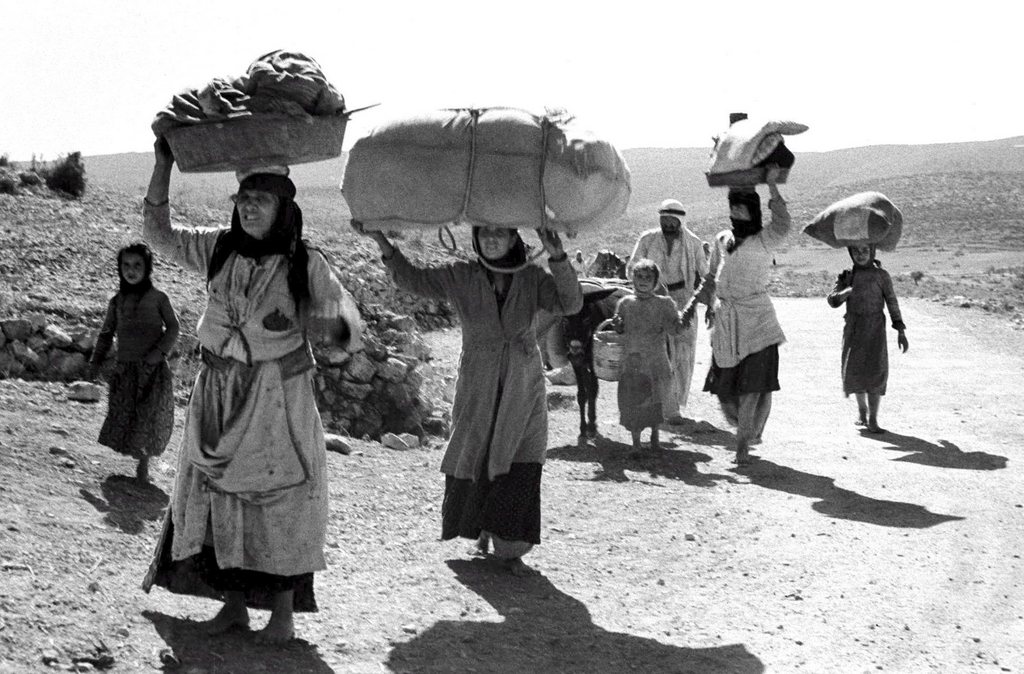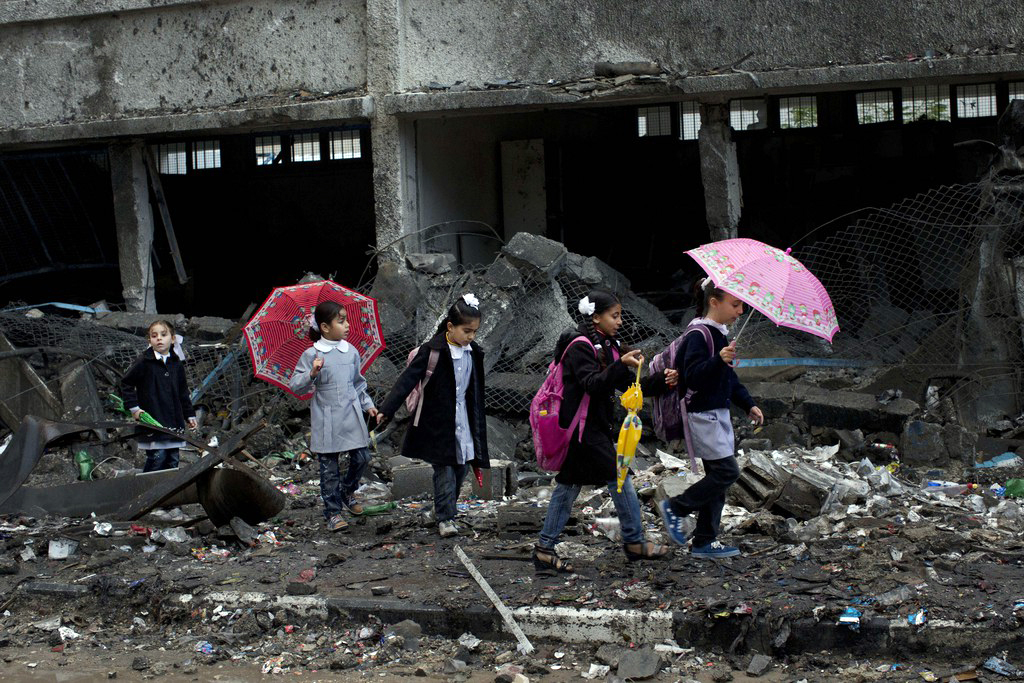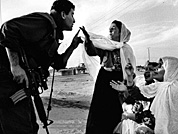Israeli-Palestinian conflict reaches Bern

An exhibition in Bern presenting the history of the Palestinian exodus has raised questions about the validity of featuring one side of the conflict. More than 700,000 Palestinians were expelled from the territory of modern-day Israel in 1948.
The exhibition, The Nakba – Flight and Expulsion of the Palestinians 1948, currently visiting the Kornhaus Forum in the Swiss capital, was put together by a German association supporting refugee children in Lebanon.
The history of Palestine and its residents since 1917 is documented on 13 large displays.
“We young people should know what is happening in the world,” said 15-year-old schoolgirl Nora Mustafa.
“The reports of the refugees made a particular impression on me,” she said while visiting the exhibition with her classmates.
An elderly visitor, Pius Dudler, said the exhibition was sorely needed. “But more emphasis should have been placed on the disastrous role of Britain as colonial power in Palestine,” he said.
Britain granted itself the mandate over the territory in violation of international law, Dudler added.
The exhibition is being supported by church groups, human rights organisations, cultural institutions and political parties including the centre-left Social Democrats and the Greens.
Raising awareness
“Through the exhibition we wanted to make a contribution to the recognition of the history of the Palestinian people,” co-organiser Elisabeth Lutz said, rejecting criticism that the information is one-sided.
“The Jewish-Zionist story is much better known than the Palestinian story,” she said, adding a conflict could only be resolved when its roots were understood.
When swissinfo.ch visited, a lively discussion started up among the visitors to the exhibition, led by Dudler. Britain did many things wrong as a colonial power in the whole Arab world, he said, which is why it carries a share of the blame for the crises in these countries today.
Another former colonial power, France, must also shoulder some of the blame for the civil war, observed another visitor, Paul Baumberger, a history buff visiting the exhibition with his wife.
Dudler said he was not anti-Semitic, but he could not understand how Switzerland, which always speaks up for justice and human rights, could support Israel.
“That’s not true at all, Switzerland is for Palestine,” another visitor argued.
An older woman complained it was “crazy that the whole world does not cry out when Israel bombards Gaza”.
Israel is damaging itself by its actions, she continued. “When Israel won the Six-Day War, I celebrated on the terraces of Bern University. Today it is completely different.”
A political solution had to be found to the Middle-East conflict, Dudler said, with Europe and the United Nations taking responsibility. “The land was clearly separated into two parts and these borders should be defended, especially against occupation by Jewish settlers.”
Bern battle
The controversy has spilled over into local Bernese politics. “My impression is that this is a very anti-Israeli exhibition, which is positioned against the state of Israel in particular,” Lea Kusano, a Social Democrat in Bern’s parliament told Swiss television.
“It’s not a very sophisticated presentation of the situation of the Palestinian refugees.”
Kusano, whose mother comes from Israel, criticised the official support for the exhibition. “It is especially leftwing organisations that support the exhibition. I sometimes think these leftwing parties do not have a very sophisticated understanding of the Israeli-Palestine question.”
She also regretted the financial contribution made by the city of Bern to the exhibition.
Alain Pichard of the Green Liberals in Biel city parliament and committee member of the Swiss Israel Society went so far as to claim history was being distorted. Important facts had been played down, he said, such as the close tie between the Arab Grand Muftis and Hitler or the expulsion of Jews from Arab lands.
Sibylle Elam of the group Jewish Voices for a Just Peace Between Israel and Palestine judged the exhibition legitimate, “when at last the other side of things can be presented just as we on our side for decades spread the image of the small David triumphing over the all-powerful Goliath”.
Popular
Bernard Giger, head of the Kornhaus Forum which is hosting the exhibition, saw the event as a success – partly because of the strong debate around it and also because of “very good visitor numbers”.
The public debate along with the recent escalation of the Gaza conflict also added to the public interest, as well as the strong support of the local organisers.
These factors helped persuade the venue to stage the exhibition. “We studied the request very closely because we knew that the exhibition was very controversial in Germany and partly not displayed,” Giger said.
The direct reaction from visitors has been consistently positive. “Many found it good that the exhibition brought some publicity to the issue.”
Even today teachers who bring up the subject of the Nakba in Israel can lose their jobs, Lutz said.
“The exhibition therefore is meeting resistance because we are confronting this taboo. In Zionist Israel, the equation ‘criticism = anti-Semitism’ has applied for a long time. The best tool to break the equation is information.”
The travelling exhibition The Nakba – Flight and Expulsion of the Palestinians 1948 runs until December 2 in the Kornhaus Forum in Bern.
The main focus is on the Arab-Jewish and Arab-Israeli civil war from the end of 1947 and the exodus of at least half of the 1.4 million Arab residents from what is today the state of Israel.
A second section of the exhibition shows videos, photos and cards depicting the current situation in the Middle East.
The exhibition is accompanied by numerous additional events such as discussions, film and theatre performances.
A podium discussion is due to take place in December.
After the end of the British Mandate to administer Palestine, Israel proclaimed the new state on May 14, 1948.
The basis for this was the 1947 UN Resolution dividing Palestine in two. The separation envisaged a Jewish and an Arab state.
Following this, an Arab-Jewish civil war broke out, leading to an exodus of the Arab population from the Jewish state.
The civil war turned into an Arab-Israeli war in 1948.
The Arab population marks May 15 as its memorial day for The Nakba, while Israel celebrates the same date as its national day.
For many Israelis, Nakba commemoration by Arab Israelis is still problematic. In 2011, parliament passed a law restricting such events.
(Translated from German by Clare O’Dea)

In compliance with the JTI standards
More: SWI swissinfo.ch certified by the Journalism Trust Initiative



You can find an overview of ongoing debates with our journalists here . Please join us!
If you want to start a conversation about a topic raised in this article or want to report factual errors, email us at english@swissinfo.ch.